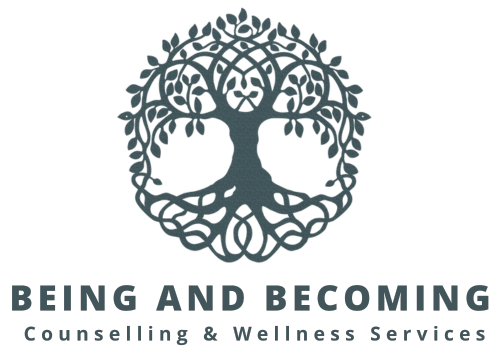BEING AND BECOMING COUNSELLING AND WELLNESS SERVICES
Anxiety Therapy
Professional support to help you find relief from anxiety — breathe easier, live fuller and reclaim your peace.
Anxiety Therapy Can Help You:
LIVE A FULL LIFE
MANAGE ANXIOUS THOUGHTS
FEEL MORE AT EASE
Do you continually worry about the worst case scenario?
We all experience anxiety, but for some it can become overwhelming. You might feel consumed by worry, constantly thinking about what could go wrong. Or maybe you experience anxiety as distressing physical sensations like difficulty breathing, muscle tension or digestive issues. These experiences may make you want to avoid the things that cause you anxiety, but as you do, your life gets smaller.
We are here to help.
Find peace and regain the fullness of your life.
COUNSELLING FOR ANXIETY MAY HELP WHEN:
You cannot stop worrying
You feel unable to relax
You experience chronic muscle tension or digestive issues
Anxiety disturbs your sleep
Anxiety is impairing your ability to function (e.g., you have difficulty focusing or doing your job, school work, or tasks required in daily life)
Anxiety is negatively impacting your relationships (e.g., anxiety cause you to withdraw or become irritable and lash out; you avoid social situations; or you try to control other people’s behaviours in an effort to manage your own anxiety)
Your life is getting smaller and more limited as a result of your anxiety. You regularly avoid people, places, situations or activities that make you anxious.
ANXIETY THERAPY IN BURNABY
What is Anxiety Counselling and How Does it Work?
We all experience anxiety. For some, anxiety can become a constant and overwhelming part of their everyday life. Whether you experience anxiety as incessant worries or as distressing and uncomfortable physical symptoms, the weight of anxiety can feel consuming and crippling. It can limit your ability to think clearly, feel in control and do things you want to be able to do.
Anxiety therapy offers a compassionate space where you can begin to understand your anxiety and learn strategies that allow you to effectively work with anxious thoughts and the physical symptoms of anxiety. These tools will allow you to gain confidence in your ability to manage anxiety so that you can begin to take back control of your life.
You deserve to feel at ease and live a full, vibrant life.
We are here to help you get there.
“Worrying is carrying tomorrow’s load with today’s strength — carrying two days at once. It is moving into tomorrow ahead of time. Worrying doesn’t empty tomorrow of its sorrow, it empties today of its strength.”
— Corrie ten Boom
Anxiety Therapy
Counselling for anxiety will differ depending on the type of anxiety you are experiencing and the way anxiety shows up for you. At the outset of counselling your therapist will help you determine the type of anxiety you are experiencing and any factors that may have contributed to its development or maintenance.
With your input, your therapist will then make a personalized plan to treat your anxiety. The approach taken with each individual will vary, but anxiety therapy often involves:
Helping you understand your anxiety
Recognizing and addressing factors that may be unintentionally working to maintain your anxiety
Equipping you with strategies to help you manage the physical symptoms of anxiety
Teaching you skills and practices to help counteract or manage anxious thoughts
Helping you shift your relationship to anxiety
Gradually decreasing avoidance of things that cause you anxiety (while a very normal and understandable response, avoidance of anxiety-provoking situations often reinforces the anxiety itself)
Processing events that may have contributed to the development of anxiety or that exacerbated your symptoms
ANXIETY THERAPY ACROSS BC
What you can expect to get out of Anxiety Counselling
Each person’s journey to overcoming anxiety will be different, but in time you may notice that you:
Feel better able to respond to, cope with, and manage anxiety when it arises
Experience anxiety less intensely and less often
Experience fewer physical symptoms of anxiety
Are able to notice and effectively deal with anxious thoughts before they overwhelm you
Are able to help your body settle and calm down when your nervous system gets activated
Are more confident in your ability to deal with everyday stressors
Feel more calm and relaxed in your daily life
Feel more confident and comfortable in social situations
Have greater understanding of your anxiety and compassion for yourself
Are less limited by anxiety; you’re not letting it dictate what you do and don’t do.
Therapists Offering Anxiety Counselling
What is Anxiety?
“Anxiety is a mental and physical reaction to perceived threats. In small doses, anxiety is helpful. It protects us from danger, and focuses our attention on problems. But when anxiety is too severe, or occurs too frequently, it can become debilitating” (Therapist Aid LLC, 2017).
Components of Anxiety
-
Anxiety may cause any of the following physiological responses:
Increased blood pressure
Rapid heart rate
Fast or shallow breathing
Digestive issues
Dizziness
Sweating
Restlessness
Shaking
Chest pain
-
Anxiety may impact your thinking. These are some common thinking patterns associated with anxiety:
Worry
Catastrophic thinking (i.e., imagining the worst case scenario)
“What If” thinking (i.e., imagining all the possible things that could go wrong)
Rumination or post-event processing (e.g., replaying an event over in your head and scrutinizing what you said or did)
-
Anxiety is often accompanied by the following emotions:
Dread
Fear
Panic
Nervouness
Irritability
-
People often engage in behaviours aimed at helping them manage their anxiety:
Avoidance of things that cause anxiety
Turning to strategies to cope with or distract from the experience of anxiety (e.g., turning to food, alcohol, or drugs; checking with the use of TV, social media or internet)
Always keeping busy to avoid having to feel or think about things that make you anxious
Difficulty making decisions
Over-planning or preparing for situations
Planing for all possible scenarios
Trying to control your environment or those around you to manage your anxiety.
Types of Anxiety
There are several different types of anxiety. It can be helpful to view them on a continuum, ranging from mild and manageable forms of anxiety to disorders that significantly impact your quality of life or impair your ability to function.
-
Individuals with generalized anxiety worry constantly about a number of events or activities (e.g., work or school performance, money, health or family).
Some individuals who experience generalized anxiety may meet diagnostic criteria for generalized anxiety disorder.
-
Individuals with social anxiety experience anxiety about social situations where they fear being scrutinized or judged by others. Common situations associated with social anxiety include meeting new people, having a conversation, being in group settings, eating or drinking in public, or public speaking.
Some individuals who experience social anxiety may qualify for social anxiety disorder.
-
Individuals with health anxiety experience persistent anxiety about their health and/or symptoms.
Health anxiety may be a symptom of a disorder, such as illness anxiety disorder or somatic symptom disorder.
-
Specific phobias are a type of anxiety disorder. Individuals with phobias experience significant anxiety or fear about a specific object or situation (e.g., driving, flying, heights, the sight of blood). The anxiety felt is out of proportion with the actual danger posed by the object or situation. Individuals with phobias typically avoid the feared object or situation or will endure it with intense fear.
-
“A panic attack is an abrupt surge of intense fear or intense discomfort that reaches its peak within minutes (American Psychiatric Association). During a panic attack an individual will experience 4 or more of the following symptoms:
Increased heart rate, heart palpitations or a pounding heart
Sweating
Trembling or shaking
Feeling short of breath or like you can’t breathe
Feelings of choking
Chest pain
Nausea or abdominal distress
Feeling dizzy, light-headed or faint
Experiencing chills or hot flashes
Numbness or tingling sensations
Feeling detached from oneself or reality
Fear of losing control or “going crazy”
Fear of dying
Many individuals who experience panic attacks may go on to develop panic disorder. Panic disorder is characterized by recurring panic attacks AND significant fear of having another panic attack or a significant change in behaviour in an attempt to avoid having another panic attack.
-
Agoraphobia is a type of anxiety disorder characterized by marked fear or anxiety about 2 or more of the following situations:
Using public transportation
Being in open spaces (e.g., parking lots, marketplaces, bridges)
Being in enclosed spaces (e.g., shops, theatres)
Standing in line or being in a crowd
Being outside of the home alone
Individuals with agoraphobia avoid the feared situations because they fear being unable to escape or fear that help will not be available if they experience a panic attack or another incapacitating or embarrassing situation (e.g., incontinence, fear of falling in the elderly)













